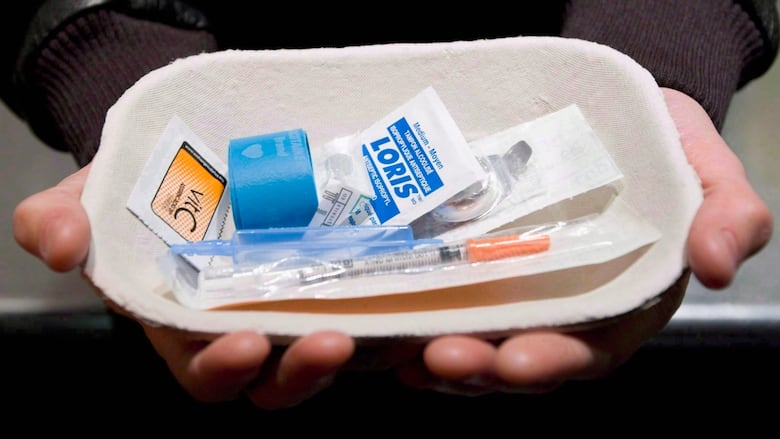Toronto harm reduction advocates pushing for pop-up safe-injection sites
Board of health chair plan would be illegal, but 1 councillor says he understands desire to save lives

Harm reduction advocates in Toronto are calling on the city to allow pop-up safe injection sites amid a series of overdose deaths.
The Toronto Harm Reduction Alliance and Ontario Coalition Against Poverty say the opioid crisis gripping the city is too severe to wait for the city to open its three safe-injection sites, the first of which is expected to be ready by this fall.
The groups are calling Friday for the city to declare a public health emergency and provide immediate funding to offer around-the-clock care to drug users until the safe-injection sites open.
If harm reduction workers decided to take the law into their own hands and open pop-up sites, I would not condemn them.- Coun. Joe Cressy
"We can't wait three months. We need something now," said Leigh Chapman, whose brother died of an overdose on a downtown street in 2015.
Matt Johnson, a front-line harm reduction worker, says if the city could provide assurances that a pop-up injection site wouldn't be shut down by the police, "we'll open one tomorrow and staff it with people who know what they're doing.
"I guarantee we'll see a drop in the number of overdose deaths," he said.
Johnson said unsanctioned safe-injection sites, which sometimes are as simple as a concerned person opening their garage to a friend or homeless person using drugs, have existed for years. Drug users also look out for one another, he said, but the fear of arrest often limits what they can do.
Pop-up sites would be illegal, health board chair says

Board of Health Chair Joe Mihevc said without the proper exemption from the federal government, pop-up injection sites would be illegal and therefore something the city can't condone.
"It's not something we're entertaining as a city," he said.
Coun. Joe Cressy said he realizes some harm reduction activists may not wait for the city's blessing.
"If harm reduction workers decided to take the law into their own hands and open pop-up sites, I would not condemn them. If that's what it takes to save a life, I understand that measure," he told CBC Toronto.
Mihevc stressed the city is working as fast as it can to open its three injection sites — spread throughout the downtown core — while also equipping more city staff with the opioid antidote naloxone and the training on how to use it.
Mayor John Tory, who held a closed-door meeting with harm reduction workers on Thursday afternoon, says the city must stay focused on its current efforts.
"I will be speaking with Ontario Health Minister Eric Hoskins as soon as possible to detail some of the issues raised in today's meeting," he said in a statement following the meeting.
"I will also be speaking to Toronto Public Health and City staff about some actions we can take municipally … including increasing access to naloxone for everyone."
City poised to take new steps to combat opioid crisis
Tory has, however, said he doesn't want to start debating whether or not Toronto should push for the decriminalization of heroin, telling reporters "I don't think now is the time to have that discussion."
Cressy and the Toronto drug strategy implementation panel did pass a motion Thursday that will go to the board of health calling for the city to take several more steps to deal with the opioid issue, including:
- Providing more funding to organizations that do front-line harm reduction work.
- Doing more to speed up the opening of supervised injection services.
- Calling on all police officers to carry naloxone — not just officers in some parts of the city.
- Start running a public education campaign about the risks of opioids and other drugs tainted with them.
The city is also encouraging the estimated 80 per cent of opioid users who do drugs alone to change their ways.
"That time is over. If you are going to be ingesting heroin then you need to do so with a partner so that someone is watching out for your health," Mihevc said.
Johnson said for many drug users, that's easier said than done. Many use alone because they don't want to share their supply, he said, or are concerned about doing drugs with someone who could pose a safety risk once they're high.
Safe-injection sites not intended for crisis situation, advocate says
Chapman said while that may make the city's safe-injection sites a groundbreaking change for drug users in the city, not everyone will be able to get to one.
"The three supervised injection services weren't intended to be a response to a crisis … so we have to stop sort of viewing them as the answer," she said.
The pop-up sites, she said, could reach more drug users in more neighbourhoods. Similar programs are already operational in B.C., she points out, and have proven to be a "vital resource."
While the temporary sites may be a tough sell, Cressy says the city recognizes the need to act and is doing what it can.
"We have an escalating crisis that is killing more people every week," he said.
"We need to do more on every level if we're going to save lives."